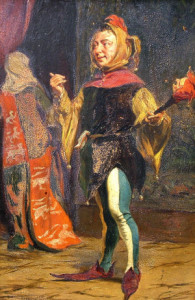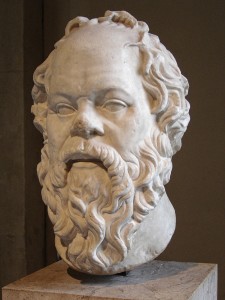
Remember studying Shakespeare in high school? Okay, it was traumatic for some, but even if you’ve never been a fan of reading 500-year-old plays, you have to admit that The Bard had a knack for creating multilayered characters, and his fools were no exception. Some were clownish, some were underdogs, and some were, well, a little too fond of the goofy juice. All of them, however, had something important to say. Shakespeare made sure his audience knew that wisdom could come from unlikely sources, and that it was a mistake to dismiss a thinker based on their age, appearance, social status, or level of alertness. Even the guy with the pointy shoes and the bells on his hat was worth a listen.
Let’s have a look at another great thinker who predated Shakespeare. He wandered around his hometown in his bare feet (don’t worry, it was someplace warm). He loved to dance, and earned the nickname “The Gadfly” by pestering anyone who would listen, with big questions. Despite being a well-known teacher of youth, some of them quite famous in their own right, he never accepted money for his tutelage, and never wrote anything down. Sound a little foolish? Perhaps, but he also valued reason above all else, and left the door open for all kinds of other wise fools by insisting that “All I know is that I know nothing.” Socrates (yeah, that’s who we’re talking about here) set the pace for much of Western thought, and long before Shakespeare ever existed, made it known that a person didn’t have to be suave or sophisticated in order to be a deep thinker.

So, why, as parents, do we have such a hard time looking like fools in front of our kids? Why, after centuries of wise fools, haven’t we embraced the notion that sometimes, in order to dig out important ideas, we might have to be a little foolish ourselves?
We might have to admit we don’t know, and that the truth isn’t always easy or pretty. Big questions are often awkward and silly, with all kinds of different answers to muddle through. At the end of the day, the goal of any philosophical question, even one asked of/by a little thinker, is to consider all kinds of points of view, to dig beneath the surface and see what else is possible. Siding with what’s comfortable and conventional just doesn’t get the job done, rationally speaking. We might say something weird, or think something “eccentric”, but that’s okay. It works.
If you’re really not okay occasionally playing the fool yourself, at least go and sit with and listen carefully to the wise fool that lives in your house. If you’re a parent, you have one under your roof. That small person who spends a great deal of time admiring bugs, getting sticky, and singing off-key, is also a fountain of great ideas. They’ve probably already caught you off-guard with a few of them, the same way Socrates bombarded the citizens of Athens, and Shakespeare delighted his audiences. Your wise little fool is challenging you to look beyond the Spiderman costume, bed head, and booger jokes to see what might be thought up, if we dared to let ourselves be open and vulnerable. Your kids, like all good fools, and walking, talking embodiments of “Why not?”
Time to take off your shoes, put on your pointy hat, and join the silliness.
Cheers to fools!
